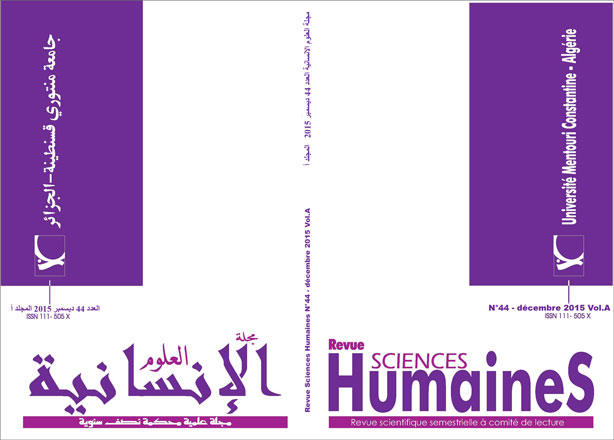SCHOLARLY PUBLICATION: Editorial constraints versus NNS strategies
Keywords:
SCHOLARLY PUBLICATION, NNS strategiesAbstract
The issue of scholarly publications written by Non-Native Speakers (henceforth NNS) has, over the last decade, attracted the interest and concern of a great number of researchers. They have sought to find out the reasons that lie behind the rejection of papers by academic journals and editorial boards. These range from an editorial prejudice from the North towards the South, to a linguistic bias against non-English Speakers. Despite the many difficulties which NNS scientists encounter, a few manage to carve their way into this closed world of research. The purpose of this paper is to describe the strategies which have helped Algerian scientists to acquire membership in the field of scholarly publication. Using a qualitative methodology (verbal accounts as well as written records), the research examines how Non-English Speaking scientists negotiate their contributions into peer-refereed English journals, and how the international audience responds to their submissions.
Downloads
References
Canagarajah, A. S.(1996) Non discursive requirements in academic publishing, material resources of periphery scholars, and the politics of knowledge production. Written Communication. Vol.13/4: 435-472
Flowerdew, J. (1999a) Problems in writing for scholarly publication in English: The case of Hong Kong. Journal of Second Language Writing Volume 8, Issue 3, September 1999, Pages 243–264
Flowerdew, J.(1999b) Writing for scholarly publication in English: The case of Hong Kong Journal of Second Language Writing Volume 8, Issue 2, May 1999, Pages 123–145
Flowerdew, J. (2001)Attitudes of Journal Editors to Nonnative Speaker Contributions.TESOL Quarterly, v35 n1 p121-50 Spr 2001
Gosden, H (1992) Research writing and NNSs: From the editors. Journal of Second Language Writing. Vol. 1 /2: 123-129
Hyland, K. (2010) English for professional academic purposes: writing for scholarly publication. In: English for Specific Purposes in Theory and Practice. University of Michigan Press, Ann Arbor, MI, U.S.A., pp. 83-105
Johns, A.M (1990)L1 composition theories: Implications for developing theories of L2 composition. InB.Kroll (ed.). Second Language Writing. Cambridge. Cambridge University Press: 24-36
Lillis, T and M.J. Curry (2010) Academic Writing in a global context: the politics and practices of publishing in English; Routledge
Lindsey, D. (1978) The Scientific Publication System. San Francisco. Jossey –Bass publishers in social science
Matsumoto, K ( 1995) Research paper writing strategies of professional Japanese EFL writers. TESL Canada JournalVol 13 N°1: 17-27
Myers, G. (1985)The social construction of science and the teaching of English: An Example of research. In P. Robison (ed).Process and product ELT Documents Vol.129:143-150
Rymer, J. (1988) Scientific composing processes: How eminent scientists write journal articles. In C.A. Jollifee (ed.).Advances In Writing Research: Writing In Academic Disciplines. 2. Norwood Ablex: 211-250
Salager-Meyer, F. (2008) scientific publishing in developing countries: challenges for the future. Journal of English for Academic Purposes. 7: 121-132.
Sionis, C. (1995) Communication strategies in the writing of scientific research articles by non native users of English. English for Specific Purposes. Vol. 14/2: 99-113
St John, M.J. (1987) Writing processes of Spanish scientists publishing in English. English for Specific Purposes Vol.6/2:113-120
Swales, J.M. (1985)English language patterns and authors’ first language: preliminary explorationsScientometrics8/1: 91-101
Swales, J.M. (1990) Genre Analysis: English in Academic and Research settings. Cambridge: CUP
Tang, R. (2012) Academic Writing in a Second or Foreign Language: Issues and Challenges Facing ESL/EFL Academic Writers in Higher Education Contexts. Routledge
Ventola, E. and A. Mauranen (1991) Non-native writing and native revising of scientific articles. In E.Ventola (ed), Functional and Systemic Linguistics. Approaches and Uses. Berlin: Mouton de Gruyter. 457-492
Wood, A. (2001) International Scientific English: The language of research scientists around the world. In Flowerdew. J and M. Peacock (Eds.) Research Perspectives on English for Academic Purposes. Cambridge: CUP 71-83












